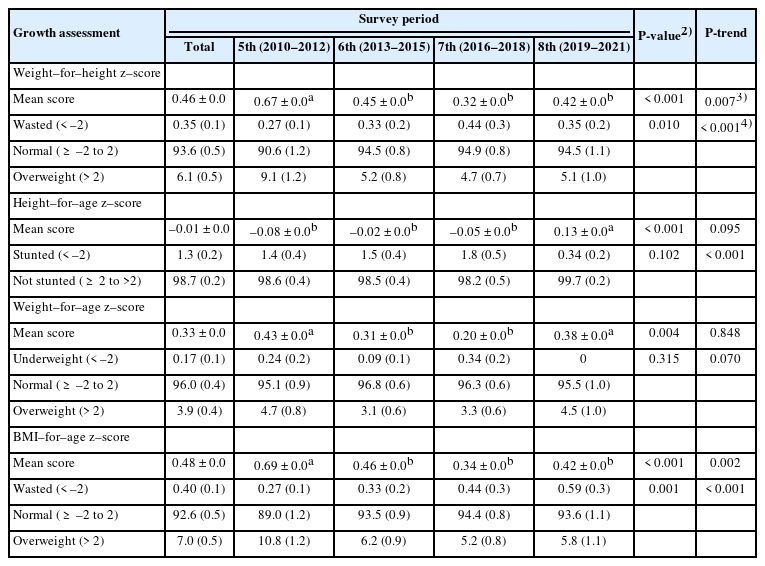Search
- Page Path
- HOME > Search
Research Article
- [English]
- Trends in growth and nutritional status of Korean toddlers and preschoolers: a cross-sectional study using 2010–2021 Korea National Health and Nutrition Examination Survey data
- Annisa Turridha, Jae Eun Shim
- Korean J Community Nutr 2024;29(6):480-491. Published online December 31, 2024
- DOI: https://doi.org/10.5720/kjcn.2024.00241

-
 Abstract
Abstract
 PDF
PDF - Objectives
We aimed to analyze trends in growth and nutrient intake patterns in Korean toddlers and preschoolers and generate data for international comparisons of early childhood growth status.
Methods
Overall, 3,661 children aged 1–4 years were included. This study used the data from the 5th–8th Korea National Health and Nutrition Examination Survey. The weight-for-height, height-for-age, weight-for-age, and body mass index-for-age z-scores of the participants were calculated using the World Health Organization 2006 child growth z-score reference cutoff points. The 24-hour recall method was used to determine dietary intake, which was assessed according to the Dietary Reference Intake for Koreans. All statistical analyses were conducted and weighted according to a complex sample design.
Results
Most Korean toddlers and preschoolers demonstrated normal growth, with an increasing trend noted over the survey period. Concurrently, the prevalence of overweight decreased. The mean intake of energy from fat exhibited an upward trend, paralleling that of protein and fat. Conversely, the intake of several essential micronutrients declined. The prevalence of nutritional inadequacy showed significant variation throughout the survey period; the proportion of inadequacy in carbohydrate intake decreased, whereas those of iron, vitamin A, thiamin, niacin, and vitamin C increased.
Conclusion
South Korea is making significant progress in supporting toddlers and preschoolers, as evidenced by consistent increases in the proportion of children with normal growth and decreases in the prevalence of malnutrition. Future research should focus on exploring dietary patterns and analyzing specific food groups that are essential for promoting optimal growth and nutritional status in children. -
Citations
Citations to this article as recorded by- Dietary Assessment and Trends Among Preschoolers in South Korea: Data from KNHANES 2012–2021
Yong-Seok Kwon, Ye-Jun Kim, Eun-Kyung Kim, Jin-Young Lee, Yangsuk Kim, Sohye Kim
Nutrients.2026; 18(2): 240. CrossRef
- Dietary Assessment and Trends Among Preschoolers in South Korea: Data from KNHANES 2012–2021
- 5,949 View
- 59 Download
- 1 Crossref


 KSCN
KSCN

 First
First Prev
Prev



